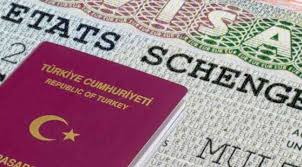The dream of a European summer vacation, filled with strolls through historic cities, sun-soaked coastlines, and cultural immersion, has hit a significant roadblock for many travelers in 2025. The Schengen visa appointment system, critical for accessing 29 European countries, is facing unprecedented demand, leaving appointment slots fully booked until mid-August. This bottleneck is forcing travelers to rethink their plans, delay their trips, or explore alternative destinations. This article delves into the intricacies of the current Schengen visa crisis, explores the underlying causes, and offers detailed insights into alternative travel options, supported by expert opinions and emerging travel trends.
The Schengen Visa System: A Brief Overview
The Schengen Area, comprising 29 European countries, allows visa holders to travel freely across member states without internal border controls. This zone includes popular destinations like France, Italy, Spain, and Germany, as well as lesser-visited nations such as Estonia and Slovenia. For travelers from countries requiring a Schengen visa, such as the UAE, securing an appointment at a consulate or visa processing center is the first step. However, the process has become a significant hurdle in 2025 due to overwhelming demand.
How the Schengen Visa Process Works
Obtaining a Schengen visa involves several steps: booking an appointment, submitting an application with supporting documents (e.g., passport, travel itinerary, financial proof), attending an interview (if required), and awaiting visa processing, which can take anywhere from two weeks to a month. The visa, once granted, allows stays of up to 90 days within a 180-day period across the Schengen Area.
Travel agents report that the current bottleneck lies in the appointment booking phase. According to Subair Thekepurathvalappil, senior manager at Wisefox Tourism,
“There are no appointments for any country at the moment.”Limited slots for Greece in late July are quickly snapped up, leaving many travelers stranded.
Why Are Appointments Fully Booked?
The surge in demand for Schengen visas in 2025 can be attributed to several factors. First, the post-pandemic travel boom continues, with many eager to explore Europe after years of restrictions. Second, the UAE’s growing expatriate population, particularly from visa-requiring countries, has increased application volumes. Third, limited consular staff and processing capacity have struggled to keep up with this demand, creating a backlog that extends well into the summer season.
Travel Weekly reported in early 2025 that European consulates worldwide are grappling with staffing shortages and outdated booking systems, exacerbating delays. Additionally, the popularity of certain destinations, such as Italy and France, has intensified the competition for visa slots, as these countries are top picks for UAE travelers seeking cultural and culinary experiences.
Impact on Travelers: A Summer Dream Deferred
For families planning European vacations during the school break (typically June to August), the lack of visa appointments is a significant setback. Even if a traveler secures a slot in mid-August, the subsequent processing time—often two to four weeks—pushes travel dates into September, when school resumes and Europe’s summer charm begins to fade.
Voices from the Industry
Travel consultant Pavan Poojari of Luxury Travels highlights the frustration:
“A lot of people want to travel, but they have no choice but to look for other options.”This sentiment is echoed across the travel industry, with agents urging clients to remain flexible or pivot to destinations with simpler visa processes.
The high demand for Italy and France, in particular, stems from their iconic attractions—Rome’s Colosseum, Paris’s Eiffel Tower, and the Amalfi Coast’s scenic beauty. However, the inability to secure timely appointments has forced travelers to reconsider their itineraries, often at the expense of long-planned dream vacations.
Hidden Truths: Systemic Issues in Visa Processing
Beyond the immediate booking crisis, deeper systemic issues contribute to the problem. Consulates and visa processing centers, such as VFS Global, rely on limited appointment slots allocated monthly. These slots are often booked within minutes of release, sometimes by automated systems or agencies charging premium fees to secure them. This practice, while not illegal, disadvantages individual travelers who lack access to such services.
Moreover, the Schengen visa system was not designed to handle the current volume of applications. A 2024 study by the European Travel Commission noted that visa processing times have increased by 20% since 2019, with some consulates reporting backlogs of over 100,000 applications during peak seasons. The study also highlighted disparities in processing efficiency, with smaller embassies (e.g., Slovenia or Latvia) often having shorter wait times but fewer applicants due to their less popular destinations.
Exploring Alternatives: Where to Travel Instead
With Schengen visa appointments out of reach, travel agents are steering clients toward destinations that offer easier visa processes, stunning landscapes, and unique cultural experiences. Below, we explore some of the top alternatives gaining traction in 2025.
African Adventures: Kenya, South Africa, and Zanzibar
Africa is emerging as a top choice for UAE travelers seeking visa-friendly destinations. Subair Thekepurathvalappil recommends Kenya, noting,
“The Great Migration begins in July and continues into August. It’s one of the most stunning wildlife events in the world.”This natural spectacle, where millions of wildebeests and zebras traverse the Serengeti-Mara ecosystem, offers an unforgettable safari experience.
South Africa, with its vibrant cities like Cape Town and wildlife reserves like Kruger National Park, is another strong contender. Its streamlined e-visa system allows UAE residents to apply online, with approvals often granted within a week. Zanzibar, an archipelago off Tanzania’s coast, is gaining popularity for its pristine beaches, historic Stone Town, and visa-on-arrival policy for many nationalities.
Asian Escapes: Thailand, Indonesia, and Beyond
Asian destinations are also attracting travelers with their affordability, accessibility, and diverse offerings. Pavan Poojari lists Thailand, Indonesia, Sri Lanka, Malaysia, and Japan as top picks, noting,
“These destinations are great during the monsoon and are usually cheaper compared to Europe.”Thailand’s beaches, Malaysia’s rainforests, and Japan’s blend of tradition and modernity provide rich experiences without the visa hassles of Europe.
For instance, Thailand offers visa-free entry or visa-on-arrival for many nationalities, including UAE residents, with processing times measured in hours rather than weeks. Indonesia’s Bali and Sri Lanka’s cultural triangle (Kandy, Anuradhapura, and Polonnaruwa) are also accessible with minimal visa requirements, making them ideal for spontaneous summer trips.
Turkey: A European Feel with Easier Access
For those craving a European ambiance without the Schengen visa struggle, Turkey is a compelling alternative. Pavan explains,
“You can get a Turkish visa in about a month, which is much better compared to Schengen or UK wait times.”Istanbul’s blend of East and West, Cappadocia’s fairy-tale landscapes, and Antalya’s Mediterranean coast offer a taste of Europe’s diversity with a more straightforward visa process.
Scandinavian Options: A Niche but Costly Choice
Some Scandinavian countries, such as Norway and Sweden, still have Schengen visa appointments available, but they come with caveats. Subair notes,
“These countries fall in the northern part of Europe. It becomes expensive and time-consuming to travel to the more popular southern parts like Italy or Spain from there.”For UAE travelers, the high cost of flights and accommodations in Scandinavia, coupled with the region’s cooler summer climate, makes this a less popular choice.
The Broader Travel Landscape: Trends and Insights
The Schengen visa crisis reflects broader trends in global travel. The rise of “revenge travel”—a term coined to describe the surge in post-pandemic trips—has strained visa systems worldwide. Meanwhile, destinations like Kenya and Thailand are capitalizing on this demand by offering simplified entry processes and marketing their unique attractions.
Emerging Destinations and Sustainable Travel
Beyond accessibility, many alternative destinations align with the growing trend of sustainable travel. Kenya’s safari lodges, for example, often support conservation efforts, while Sri Lanka promotes eco-tourism through initiatives like turtle hatchery visits and organic tea plantation tours. These experiences resonate with travelers seeking meaningful, environmentally conscious vacations.
Technology and Visa Processing: A Path Forward?
Experts suggest that technology could alleviate the Schengen visa bottleneck. Online application systems, already in use for countries like Australia and Canada, could streamline the process. However, implementing such systems across 29 Schengen countries requires coordination and investment, which may take years. In the interim, travel agents urge embassies to increase appointment slots and improve transparency in booking systems.
Advice for Travelers: Planning Amid Uncertainty
For those still hoping to visit Europe, flexibility is key. Monitoring visa appointment portals daily, considering less popular Schengen countries, or delaying travel to the fall may increase success rates. For others, embracing alternative destinations offers a chance to explore new horizons.
Subair remains optimistic:
“We hope that embassies can take note of the high travel demand and expect more slots to become available soon.”Until then, travelers are encouraged to plan early, stay open to new destinations, and work with reputable travel agents to navigate the complex visa landscape.



















0 Comments